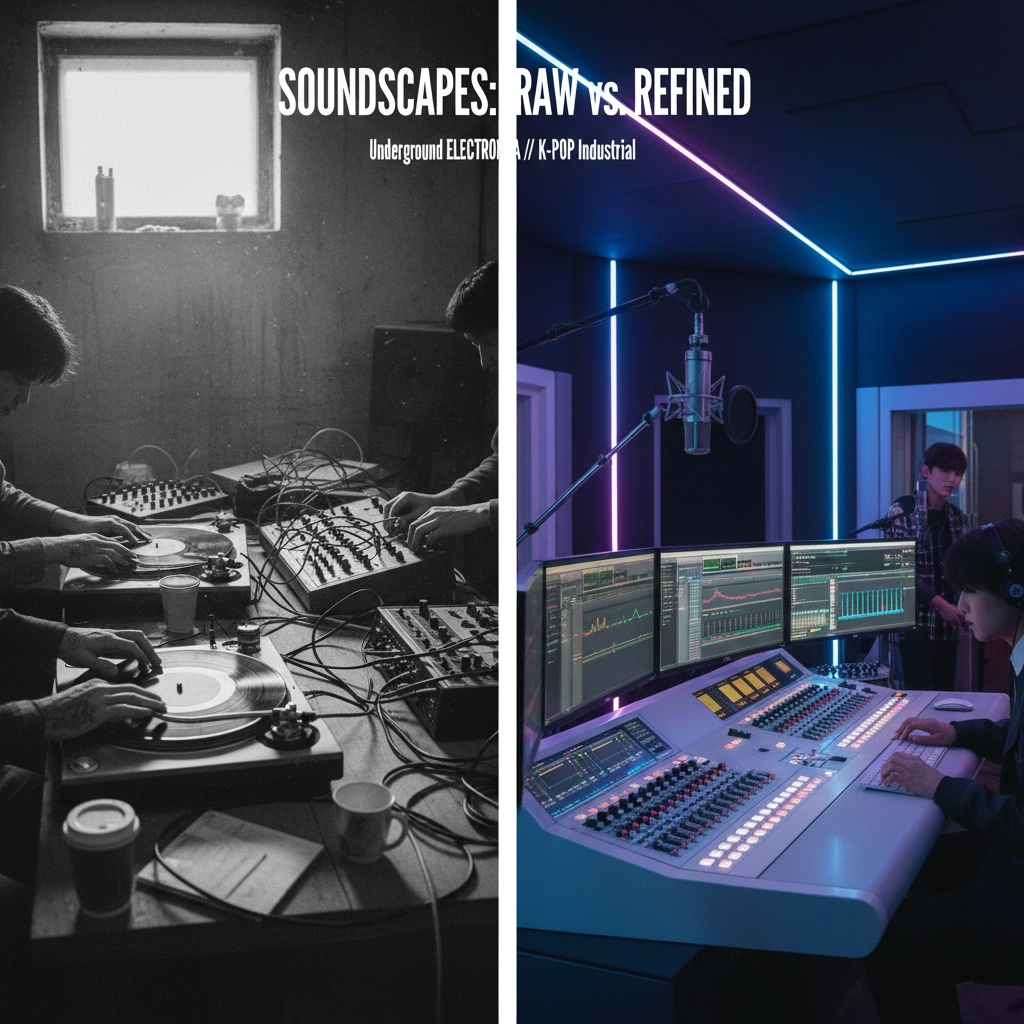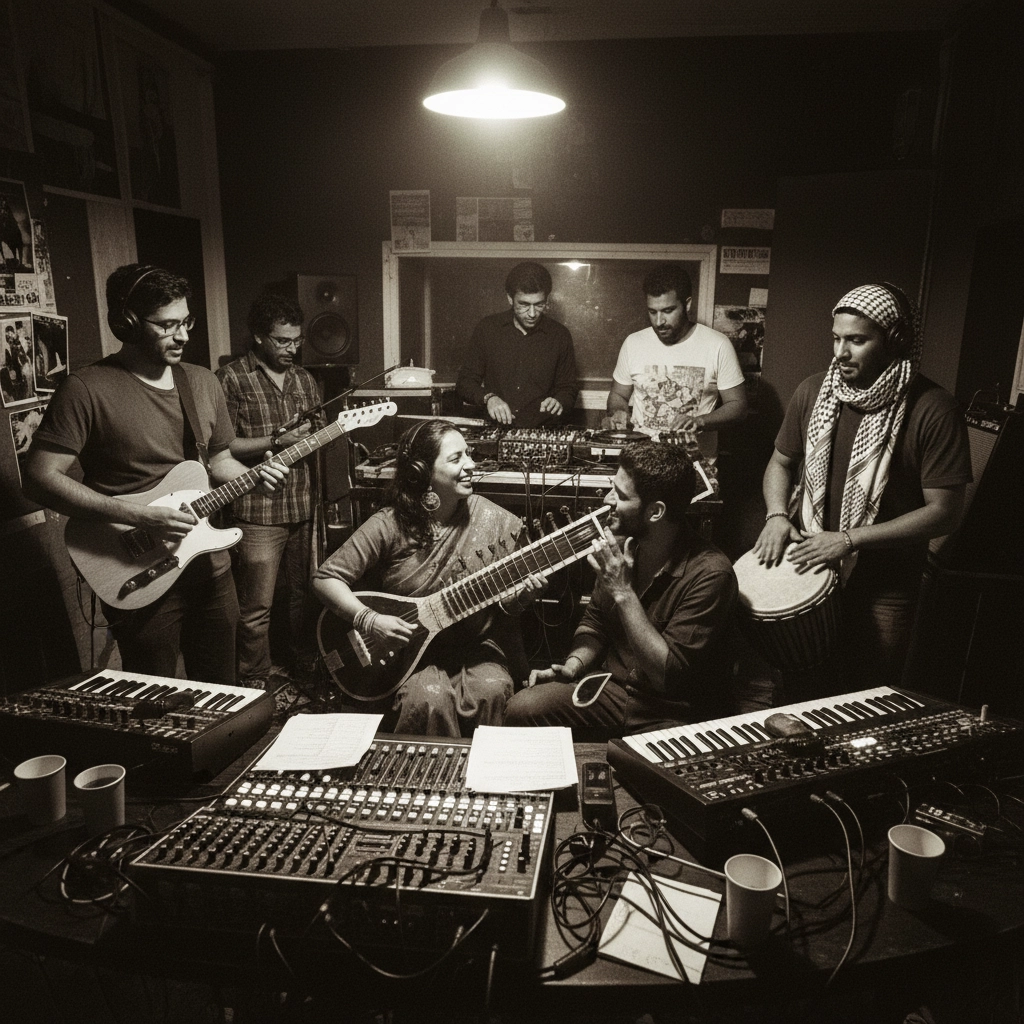K-Pop's World Takeover: What It Means for Techno, Breakbeats, and Electronic Music
- Nov 20, 2025
- 6 min read
By Alex Sterling
The numbers don't lie, and frankly, they're terrifying if you're an electronic music purist. K-pop now commands a staggering $5 billion global market, with BTS alone generating over $3.6 billion for South Korea's economy annually. When BLACKPINK's "Pink Venom" can rack up 90 million YouTube views in 24 hours while most techno tracks struggle to break 100K in a year, we're witnessing a seismic shift that's reshaping not just pop culture, but the entire electronic music ecosystem.

As someone who's spent the last decade watching underground raves transform into Instagram photo ops and seeing authentic breakbeat culture get sanitized for TikTok, I'm here to dissect what K-pop's meteoric rise actually means for the electronic music scene: and spoiler alert: it's more complex than the purists want to admit.
The K-Pop Industrial Complex vs. Electronic Music's DIY Ethos
Let's start with the obvious: K-pop operates like a surgeon. These aren't bedroom producers crafting beats at 3 AM: we're talking about multi-million dollar training programs, armies of choreographers, and marketing budgets that could fund entire electronic music festivals. SM Entertainment, YG, and HYBE aren't just record labels; they're cultural manufacturing plants designed to create global phenomena.
Compare this to electronic music's foundational philosophy: authentic expression, underground community, and resistance to commercialization. When Carl Cox plays a 12-hour set in Ibiza, he's not following a choreographed routine: he's reading the room, adapting, evolving. That spontaneity and authenticity has always been electronic music's secret weapon.

But here's where it gets interesting: K-pop's success may push electronic music to evolve or get back to underground stages. The biggest question isn't whether this is "selling out": it's whether electronic music can maintain its core values while adapting to a landscape where algorithmic reach determines cultural relevance.
The Electronic DNA Hidden in K-pop's Success
Here's what most critics miss: K-pop is already electronic music. Strip away the vocals and choreography from tracks like aespa's "Next Level" or ITZY's "Wannabe," and you're left with production techniques that wouldn't sound out of place in a many techno club. Distorted basslines, hyperkinetic percussion, and sound design that borrows heavily from UK garage and breakbeat culture.
Korean producers like Teddy Park and Bang Si-hyuk aren't just making pop music: they're creating hybrid electronic compositions that happen to feature vocal hooks. The drop in BLACKPINK's "Kill This Love" could easily be repurposed as a festival banger, while BTS's "ON" incorporates breakbeat rhythms that drum and bass producers have been using for decades.
The real genius? K-pop has figured out how to make experimental electronic production accessible to mainstream audiences. When 100 million people stream a track that features granular synthesis and IDM-influenced percussion, that's not dumbing down electronic music: it's expanding its reach exponentially.
Market Dynamics: The Attention Economy War
Let's talk numbers that actually matter. Spotify's algorithm-driven discovery now accounts for over 31% of total listening time globally. When NewJeans can generate 500 million streams in their first year while established techno legends like Richie Hawtin struggle to break 50 million career streams, we're witnessing a fundamental restructuring of how music reaches audiences.
The streaming economy rewards consistency, visual content, and parasocial relationships: exactly what K-pop excels at. Meanwhile, electronic music's traditionally anonymous producers and one-off collaborations don't generate the sustained engagement that platforms monetize.

But this isn't necessarily a death sentence for electronic music. Smart producers are already adapting: deadmau5 built a multimedia empire, while artists like REZZ and Porter Robinson have successfully incorporated K-pop's visual storytelling techniques without sacrificing their electronic core.
The Crossover Revolution Already Happening
The boundaries are already blurring, and traditional electronic music gatekeepers are missing the memo. Korean electronic artists like OHHYUK and hyukoh are creating music that seamlessly blends K-pop sensibilities with genuine electronic experimentation. Meanwhile, Western producers like Grimes and Hudson Mohawke have worked directly with K-pop acts, bringing underground electronic techniques to mainstream Korean pop.
The most interesting developments are happening in the spaces between genres. Virtual K-pop groups like K/DA use electronic music production techniques while maintaining pop accessibility. Korean DJ and producer PEGGY GOU has become a global techno star by incorporating both her Korean heritage and underground electronic credibility.
These aren't cultural appropriations: they're evolutions. When (G)I-DLE's Soyeon raps over breakbeat-influenced production, or when NCT incorporates UK drill rhythms, they're not stealing from electronic music culture: they're expanding it into new territories.
The Technology Factor: Innovation Through Necessity
K-pop's technological innovations are creating tools and platforms that electronic music producers can exploit. The industry's investment in virtual concerts, AI-assisted production, and real-time fan interaction technologies isn't just changing pop music: it's building infrastructure that electronic artists can appropriate for their own purposes.

Korean tech companies like NAVER and Kakao are developing music production and distribution tools that prioritize global reach and real-time collaboration. These platforms don't distinguish between K-pop and electronic music: they're genre-agnostic tools that could revolutionize how underground producers connect with audiences worldwide.
The Underground Response: Adaptation vs. Resistance
The electronic music scene's response has been predictably divided. Purists are retreating deeper underground, organizing smaller events and releasing music on increasingly obscure platforms. This isn't entirely negative: it's preserving the authentic community aspects that make electronic music special.
But the more strategic approach is selective adaptation. Electronic music doesn't need to become K-pop, but it can learn from K-pop's strengths: consistent content creation, visual storytelling, and direct fan engagement. The most successful electronic artists of the next decade will likely be those who can maintain their artistic integrity while embracing K-pop's innovations in audience building.
Genre Fusion: The Future Sound
We're already seeing the emergence of what I'm calling "electronic-pop hybrid" genres. Korean acts like BIBI and Lee Hi are incorporating heavy electronic production, while Western electronic artists like 100 gecs and Death Grips have influenced Korean underground scenes. This cross-pollination is creating genuinely new sounds that don't fit traditional category boundaries.
The breakbeat revival happening in both Korean indie music and Western electronic scenes isn't coincidental: it's cultural convergence. When artists from different continents independently gravitate toward similar rhythmic patterns, we're witnessing the emergence of a truly global electronic language.

The Economic Reality Check
Let's be brutally honest: electronic music as a standalone genre may not be economically sustainable in the current landscape. The costs of touring, production, and promotion continue rising while streaming revenues remain minimal for all but the biggest names. K-pop's success demonstrates the economic power of integrated entertainment: music, visual content, merchandise, and parasocial relationships packaged as a complete experience.
Electronic music doesn't need to copy K-pop's idol system, but it does need to embrace multimedia approaches to remain viable. The future belongs to electronic artists who can create immersive experiences that extend beyond just the music.
The Cultural Exchange Opportunity
Rather than viewing K-pop's dominance as a threat, electronic music communities should see it as an opportunity for authentic cultural exchange. Korean electronic artists are bringing fresh perspectives to established genres, while Western electronic techniques are influencing Korean production in fascinating ways.
The most exciting developments are happening when artists from both scenes collaborate as equals rather than one appropriating from the other. When BLACKPINK works with electronic producer Teddy Park, or when Korean electronic artist PEGGY GOU collaborates with Western techno legends, the results transcend both source cultures.
Looking Forward: Coexistence and Evolution
K-pop's world takeover isn't ending electronic music: it's forcing it to evolve. The genres that will thrive are those that can maintain their authentic cores while adapting to a landscape where visual content, consistent engagement, and global accessibility determine cultural relevance.
The future probably looks like hybrid ecosystems where purely underground electronic events coexist with K-pop-influenced electronic entertainment, each serving different audience needs. The key is ensuring that electronic music's commitment to experimentation and authentic community doesn't get lost in the rush to compete with K-pop's algorithmic dominance.

Electronic music's greatest strength has always been its ability to evolve and absorb influences while maintaining its essential character. K-pop's rise is just the latest challenge in that ongoing evolution. The artists and scenes that embrace this challenge thoughtfully will emerge stronger, while those that resist it entirely may find themselves increasingly irrelevant.
The takeover is real, but it doesn't have to be a hostile one. The most interesting music of the next decade will likely come from the spaces where these seemingly incompatible worlds collide and create something entirely new.



